The end is near for analogue radio... Part 3, satellite Freeview online and DAB
 Brian Butterworth published on UK Free TV
Brian Butterworth published on UK Free TV Radio in the Sky
Looking back to Astra UK Channels in 1997, we can see one interesting development for radio was the inclusion of the BBC Radio services on the Astra 1 analogue TV service.As each transponder could carry six associated audio feeds, UK Gold had BBC World Service and Radios 2, 4 and 5 Live in mono, and Living carried Radios 1 and 3 in stereo. In addition, Virgin Radio, which was a mono AM service could be heard in stereo from the Astra 1 satellites.
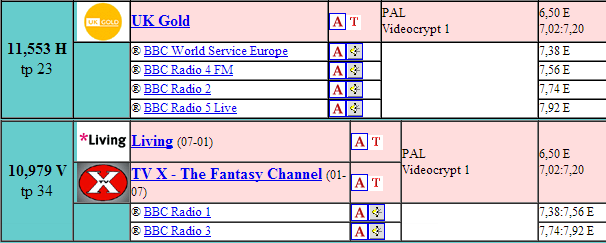
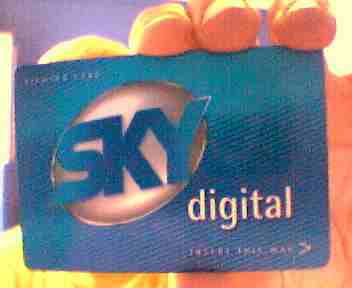 For this reason, it almost came by accident that on 1st October 1998, the new Sky Digital television service would also include lots of digital radio stations. With an abundance of capacity and the radio stations could take advantage of the MPEG2 layer III audio system (aka "MP3") and provide many radio stations in high quality stereo. The inclusion of radio stations in the channel numbers also meant that listeners could tune into radio stations without any difficult tuning issues.
For this reason, it almost came by accident that on 1st October 1998, the new Sky Digital television service would also include lots of digital radio stations. With an abundance of capacity and the radio stations could take advantage of the MPEG2 layer III audio system (aka "MP3") and provide many radio stations in high quality stereo. The inclusion of radio stations in the channel numbers also meant that listeners could tune into radio stations without any difficult tuning issues.
"Eureka"
Of course, the first "official" digital radio service developed out of the Eureka 147 project - see DAB: an introduction to the Eureka DAB System and a guide to how it works, which gave the world MPEG-1 layer II audio MPEG-1 Audio Layer II.The BBC started test transmissions of DAB in January 1990, and its national DAB multiplex went on air in 1995.
The DAB service was thought of as a way of supplying superior quality sound for the existing five BBC network radio stations. However, the very high cost of receivers, around £800 back in 1998 (£1200 in today's prices). The BBC launched digital radio in the UK in 1995 followed by national commercial multiplex operator Digital One in 1998.
"Extending Choice"
However, as early as 1992, the BBC had published "Extending Choice", which proposed that the BBC stop chasing mass audiences, and provide high quality services to audiences that the commercial broadcasters were not. This first camge to fruition in September, 1998 ( BBC News - ENTERTAINMENT - BBC unveils digital TV) when the BBC News 24, Choice and Knowledge channels were announced, and that DAB would soon have BBC Parliament (an audio service), the Asian Network and a side-channels to back-up Radio Five Live.Since then local DAB (digital radio) commercial services have become available offering non-national BBC Radio and ILR on a local basis.
Greg Dyke, the BBC DG in 2001 BBC News - TV AND RADIO - Dyke warns of digital backtrack made a decision to launch three new networks, codenamed X, Y and Z. These became 1Xtra, 6Music and BBC7 (see radio-now.co.uk )
This was a strategic decision to remove DAB from being a "sound quality" proposal to one of "listener choice". However, DAB radios still cost £300 (£420 at today's prices).
Radio Freeview
So, it was quite fortunate for these stations that the big digital terrestrial balls-up that had been ONdigital (see ONdigital Timeline - ONhistory for more) resulted in the BBC having two DTT multiplexes to fill when the replacement service Freeview launched.For quite some time, the second multiplex only carried BBC FOUR and Cbeebies, and there were plenty of bits left for all of the BBC national stations to be carried to most homes in very high quality.
As the new BBC radio stations came on air, they were also added to the digital satellite platform.
From 15 November 1999 the first national DAB commercial multiplex "Digital One" launched. This now adds another 15 national stations.
For those who are not happy with the provision of more services at lower bitrates, most UK radio stations can be listened to online at high quality. The unexpected popularity of listening to radio on Freeview has allowed many homes to sample stations that would otherwise have been exclusive to DAB. Now when people consider a DAB purchase, many "new" stations are already familiar.
The most recent figures show that 52.5% of the population tune in to digital radio every week: 65% of that is DAB, 15% on Freeview, Freesat and Sky, and 15% online. See RAJAR DATA RELEASE | QUARTER 2, 2013
How many people are listening on long and medium wave?
Due to the cuts imposed on the BBC from the Licence Fee being frozen, the BBC is looking into removing the Long and Medium Wave services.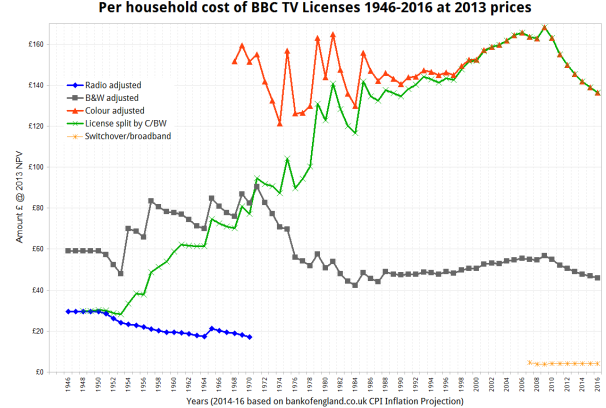
According to BBC News - BBC set to cut ... 2017 "There will also be no reinvestment in long wave, which will lead to the end of Radio 4 on LW in the long term".
"The BBC says the eventual closedown of the Long Wave service is determined not so much by the digital switchover but a dwindling supply of valves used by the Droitwich transmitter, owned and operated by Arqiva. At the last count there were only 10 left and their operating life is put at between one and 10 years" (from Will the move to digital cut off my long-wave radio? - Telegraph).
As part of the DQF process, four BBC local radio stations closed down on medium wave. At three of these there were no complaints, but at BBC Radio Mersyside, according to BBC criticised for AM radio shut-down - Media - theguardian.com 600 listeners complained.
Using this as a baseline, 600 listeners from a potential 1,664,000 (from RAJAR) pairs of ears, makes 0.0361% of the population.
If we multiply this up by 53,205,000 (that RAJAR national 16+ figure) we get 19,200.
If there are really only 19,200 people listening to long and medium wave, then it's probably time to turn off the service.
If you look at it the other way, then a service proposal to cover 20,000 people in the UK from 73 transmitters wouldn't be regarded as economic.
It may also be worth noting that if you can't get your BBC radio stations from DAB, or satellite, or Freeview, or online: it is doubtful you are paying for a TV Licence.
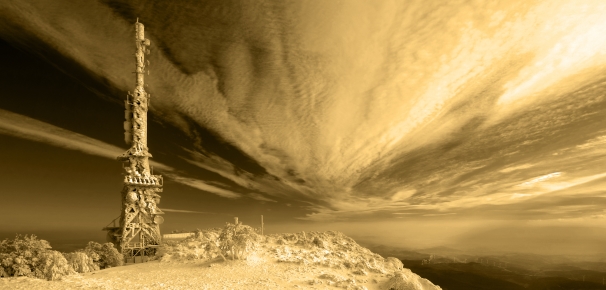
So why switch of FM/VHF?
In the last part, The end is near for analogue radio... radio gets very high - Digital radio the limited FM radio spectrum prevents the UK having more than 5 national FM stations.DAB, with just two national multiplexes provides 25 stations. There is space reserved for a second national DAB service, which could add another 15.
In London, there are an additional three DAB multiplexes adding brining the total stations to over 55. Central Scotland has 45 stations.
Over the last few years, the BBC and commercial operators have been making the DAB local radio network match the FM local radio network - Ofcom - Annex B. Local DAB build-out plans. There are still a few areas of the UK to cover - notably Derbyshire and West Wales - but both in car, and in home, DAB reception is as good as or better than FM.
But there are 758 FM transmitting masts in the UK, some carrying as many as 12 FM stations (Black Hill (North Lanarkshire, Scotland) analogue radio transmitter ) This is a considerable cost for the radio broadcasters because DAB is as low as one-sixth of the cost of FM transmission.
"Transmission will be cheaper, too. DAB can be transmitted at lower power than today's FM and AM signals yet with no loss in geographic coverage, which means less cost to the broadcaster (and less power consumption means DAB is more environmentally friendly than conventional FM and AM)." - WorldDMB - Frequently Asked Questions (FAQ)
The current plans are to announce a rolling switch off of VHF for the BBC and commercial broadcasters: the switch off will occur areas where digital radio use is highest. Community radio stations (which are not profit making) will continue on FM.
However, the recent success of the Small Scale DAB The potential for lower-cost transmitting stations in support of DAB rollout suggests that community radio could now be very cheaply provided by DAB too.
Now in 2013, you can grab a DAB radio from your local supermarket for £20 ASDA Portable DAB Radio - Radio - ASDA direct - one sixtieths of the cost in 1998, there is little standing in the way of radio choice being available in every UK home.
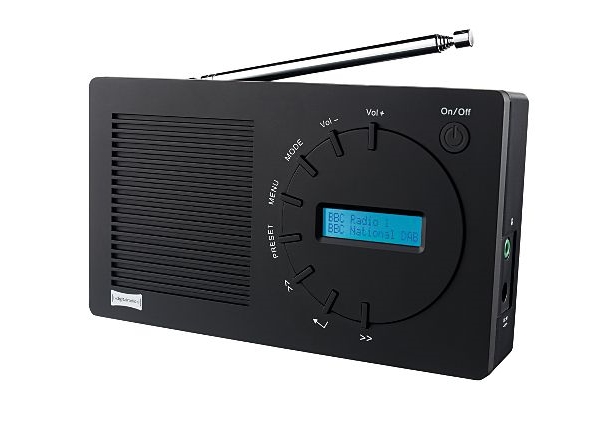
Help with TV/radio stations?
In this section
Thursday, 29 August 2013
T
Trevor Harris6:00 PM
Why the end of analogue radio is not near.
Firstly as I said in my previous post there has never been any proposal to switch off FM transmisions in the UK. The proposal by the Governmant and the BBC is only to switch off the the BBC's national services. The FM band will continue to be used for broadcasting. There are no current plans to switch off FM. The talk of a switch off was to fool people into buying DAB radios makeing them believe that there FM radios would go silent.
The Governments proposal is to switch off the national stations when the proportion of listeners listening on FM drops to 50%. Well just think about that for a minute. If they were to do this 50% of listeners will loose thier radio service over night. Even the BBC would not want to loose half thier radio audiance in one go. It will also mean that millions of licence payers would be denied a radio service. Neither the BBC or the Government would be stupid enough to do this.
DAB is dead. Long Live FM.
| link to this comment |
Trevor Harris: Let's see. My article says
"Community radio stations (which are not profit making) will continue on FM. "
The government will announce the switch off DATE when listening on digital reaches a level. It is expected that there will still be a few years to allow people to adjust.
"It will also mean that millions of licence payers would be denied a radio service"
No, it won't. I will mean they have to use a system they already have: Freeview, Sky, online ... or get a £20 DAB radio from Asda. Or £17.97 from Argos ... Buy Argos Value Range DAB/FM Radio - White at Argos.co.uk - Your Online Shop for Radios.
To characterise that as "denied a radio service" is extreme. overstatement.
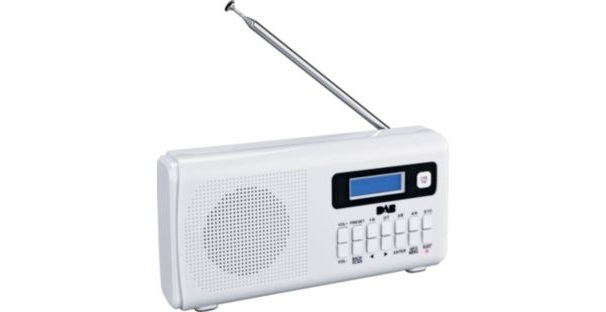
I find it very strange that you are so set on other people not having a choice of stations to listen to, just because you are happy with the few stations you can get on FM.
The only person who is interested in "denying a radio service" are those who try to stop choice being available to everyone.
Your position is somewhat selfish, perhaps...as money saved from FM transmission could be recycled into more content.
| link to this comment |
R
Russ Dring6:55 PM
Chichester
Live broadcasts on BBC Radio 3 FM are exceptionally good, almost like being present at the concert. DAB does not approach the same quality. The sound is compressed, brittle and cold. FM sounds warm and full bodied.
Those of us who have a reasonable HiFi system, which has a radio tuner will lose out dramatically should national VHF FM services be curtailed.
I bought a DAB radio tuner several years ago to compliment my system, after a few hours if listening it was relegated to the loft, it has remained there ever since.
I'm not against progress but, a retrograde step, is a step too far!
| link to this comment |
Russ's: mapR's Freeview map terrainR's terrain plot wavesR's frequency data R's Freeview Detailed Coverage
Russ Dring: As I said in the article, since 2001 DAB has been regarded as a platform for choice, rather than exceptional sound quality.
If you want to listen to Radio 3 properly, I would have the "HD" high quality audio stream (320kbps AAC) as this is much better than FM can manage.
BBC - Radio 3 - Help; has details.
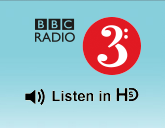
HD sound means High Definition sound.
Sound reaches our ears via analogue sound waves. However processing these sound waves electronically tends to distort their original shape. Modern digital processing is much less distorting. The conversion of an analogue signal to a digital signal is achieved by sampling the sound waves. We are now delivering the sampled 'HD' sound at a rate of 320 kb/s (AAC), which delivers more audio information and results in better sound, compared to the previous rate of 192 kb/s.
What is the best way of listening to Radio 3 HD?
If you listen on the small speakers built into a laptop you're unlikely to notice a big difference, but if your computer is connected to a good-quality sound system or high-quality headphones we think you'll appreciate the extra clarity and detail in the sound.
| link to this comment |
Remember than FM audio component signal is fixed within just 15kHz :

AAC at 320 kb/s offers a much better dynamic range.
Also, it's not "joint stereo" so the stereo image is not compromised.
There's a good description here -
FM broadcasting - Wikipedia, the free encyclopedia .
Doing a dump on Radio 3, I get
INFO: audiocodecid mp4a
INFO: aacaot 2.00
INFO: audiosamplerate 44100.00
INFO: audiochannels 2.00
Find about about AAC here Advanced Audio Coding - Wikipedia, the free encyclopedia
| link to this comment |
M
michael 7:55 PM
The current DAB commercial on BBC television may indicate that another announcement is in the offing. (Is the Napoleon-Lookalike a Waterloo prophecy?) We will eventually have to accept the diktat from on high. DAB will offer more stations and stable reception on fixed receivers, less so on battery-hungry portable radios. A roof aerial may be needed. Local BBC radio and some favourite commercial stations may no longer be received - except on a computer or webradio. Dropouts may be better - or worse - on the road, depending on the plethora of filler transmitters. Audio quality will vary. Brave New World ! Que sera, sera...
| link to this comment |
T
Trevor Harris7:57 PM
@briantist
"Community radio stations (which are not profit making) will continue on FM. "
This assumes that the Government will be able to persuade commercial stations to move off FM. The only reason many commercial stations transmit on DAB is that they were bribed by Ofcom guaranteeing them an FM frequency if they are on DAB. Its very unlikely they would be profitable as DAB only stations. If the BBC were to leave FM this would release FM frequencies creating a big demand from commercial stations. Ofcom is unlikely to give these frequencies to non profit stations when they could make lots of money selling them to commercial operators.
"It will also mean that millions of licence payers would be denied a radio service"
FM is very popular in cars and is a very significant audiance so millions of listeners would be denied. FM has RDS which DAB does not support. As for Freeview or Satallite they are not portable . Not everyone has a TV in every room!!. Yes internet would be an option but if they did this DAB radio listening would still be low and not worth continuing. Just goes to show that DAB is redundant and a complete waist of money.
"I find it very strange that you are so set on other people not having a choice of stations to listen to, just because you are happy with the few stations you can get on FM."
Thats a bit sharp. I am not against choice but I am against the BBC forcing DAB down our throats when the majority don't want it. DAB was never designed increase choice. Choice has been achived by sacrificing quality. Back to mono with an audio quality lower than AM. I did not say I was happy with what you can get on FM. Infact most of my radio listening is on the Internet which gives me a massive choice and a very high quality on some stations. There are some stations which are broadcasting in the uncompressed FLAC format.
"Your position is somewhat selfish, perhaps...as money saved from FM transmission could be recycled into more content"
Ha Ha the money is more likely to end up in BBC executives pockets.
| link to this comment |
michael: Let me see
"Local BBC radio and some favourite commercial stations may no longer be received - except on a computer or webradio. "
That's incorrect. The DAB plan will have local radio coverage matching or exceeding FM for local radio from both homes and roads.
"Dropouts may be better - or worse - on the road, depending on the plethora of filler transmitters. "
I'm not sure where you get that from. SFN networks are exceptionally good at avoiding dropouts.
"Audio quality will vary"
But it will always be "acceptable".
| link to this comment |
Trevor Harris: "This assumes that the Government will be able to persuade commercial stations to move off FM."
They HAVE already accepted this. They have signed up to the switchover plan and they are very keen to get rid of expensive FM.
I know you don't like it, but the whole of the radio industry is signed up to the plan.
This - http://www.gov.uk/governm….pdf - is the plan and
"The Ministerial Group is chaired by the relevant Government Minister and includes representatives from the BBC, commercial radio broadcasters, community radio broadcasters, transmission providers, Ofcom, manufacturers, the automotive sector, retailers, consumers and Digital Radio UK. "
Just not you...
| link to this comment |
Trevor Harris:"I am against the BBC forcing DAB down our throats when the majority don't want it."
I note with interest that use of digital radio is over 50% now. "52.5% of the population tune in to digital radio every week" http://www.rajar.co.uk/do….pdf
that rather puts your "majority don't want it" point to bed.
"DAB was never designed increase choice."
So, I have 55 radio stations to listen to. What are they if not choice?
You are correct, DAB was not originally marketed as being to increase choice, but it has for ... over a decade and you should probably accept it now.
| link to this comment |
Select more comments
Your comment please!